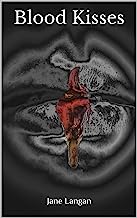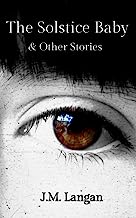Interview with Jane Langan
- lotenwriting
- Jul 29, 2023
- 7 min read
I met Jane through the Open University's MA course and we went on to join a writing group together, as well as running Makarelle alongside our friend, Dini and then launching Castle Priory Press together. Therefore, it was a delight to sit down and ask her some questions around her new book, 'The Solstice Baby'. The book is a collection of short stories in a variety of genres and I will be posting my review of it tomorrow. Today's blog however, is about getting people to know Jane and her writing a bit better. One of the things I find most fascinating is the different things that inspire writers and the multitude of ways that they approach the craft. Although there are obviously many similarities in how we tackle our writing, it is the differences that intrigue me because they are what make each writer unique.

Jane wanted to be an actor. At eighteen, she realised this wasn’t for her and her true love was writing and photography. She has been doing that ever since. Her book of poetry, Blood Kisses is out now. You can also find her work in the anthology Footprints and Echoes, (both available on Amazon). She has been published extensively online and was shortlisted in the lockdown Haiku competition with Fish Publishing. She had a special mention from The Welsh Poetry Competition and was longlisted in the Mairtin Crawford Awards. Jane has a master’s in creative writing.
When she isn’t writing or taking pictures, you will find her tap dancing or drinking coffee curled up with one of her cats.
Many of your stories come from quite a dark place. What is it that attracts you to this kind of story?
I think I have always had a bit of a dark side. When I was a child, I suffered from terrible nightmares and lived in a big old spooky house. Some of my dark stories stem from that. As I got older, I was a Goth and enjoyed gothic literature, like Dracula, Frankenstein, The Turn of the Screw etc – There is a part of me that never grew out of that and I would still love to write a gothic classic!
There is a whole section of the book dedicated to the theme of nature. I know this is something that is really important to you and a lot of your photography is of the natural world. How far do you think the two creative sides of you overlap? For example, have you ever taken a photograph and then been inspired to write a story about it?
I have been a member of Friends of the Earth since the age of eighteen, and if I were religious, it would be Mother Earth I would praise. Sadly, we live in a world where nature isn’t at the forefront of everyone’s thoughts and yet it has been proven to lift the spirits and help people who are suffering with mental health issues (if has definitely helped me through some of my darker times).
I have a small suburban garden but it is my nature sanctuary. Most of my photo’s come from there and yes, sometimes the writing and the stories overlap – Fairy Clocks – is about a real neighbour. Their light is on all night and does disturb my sleep. That is where the similarity to the story ends. There are others in the book that have come to me while in the garden as it is a place my mind can wander and explore ideas. I would recommend five minutes of outside contemplation every day.
Dysfunction of one kind or another features quite heavily in this collection. What do you think makes this theme such an interesting one to write about?
When I did my degree in drama, I was told conflict was at the heart of all drama. I still believe that to some extent – and dysfunction is an element of that, whether it is a dysfunctional world, person, animal, plant, robot, computer or whatever this can be the start of a story. Sometimes, this can lead to an unpleasant end but on the other hand the dysfunction can be fixed or improved to be a fully functioning thing and that can be transformative. I think this goes back to my gothic past. If you consider Dracula and Dr Frankenstein – these stories are all about dysfunction and transformation.
You previously self-published your poetry collection ‘Blood Kisses’ but this time you’re publishing under our company imprint. How different were the two experiences of publishing?
This was so much simpler. KDP formatting can be a bit of a swine, at CPP we have the right tools to speed the process up and make it an easier for the author – I have also had the support of CPP via social media that furthers my reach, so I have made more sales – which is lovely. In fairness, the marketing is the part I find the hardest so this is a great help.
Other than the obvious difference in length, what would you say were the main differences between writing novels and short stories? How easy is it to write a novel if you’ve written short stories already?
The two are very different disciplines. The short story is usually a simpler process, with only one story and no subplots and less characters. It is a more linear approach. The novel is far more complicated – You are creating numerous characters and subplots whilst trying to keep it clear and readable. I know some people create family trees to help them remember who everyone is in relation to everyone else – I tend to use index cards, with significant characteristics, pets, etc.
Similarly, the level of research is more significant for a novel than a short story as you need more information – I have recently read the Miniaturist by Jessie Burton which is set in Amsterdam and looks at life of a young wife married to an older merchant working for the Dutch East India Company. I am in awe at the amount of research that must have been completed to create this story.
My most recent novel is set in the 1980s, so most of my research was about whether we would have said certain things then, or if a particular record was available at that time – much simpler stuff!
You write in all 3 major written forms – novel, short story and poetry. Do you think each serves a different purpose to you as a writer?
Definitely.
My poetry is more personal, it is about me, my feelings, and what is going on in my life. I have written more abstract poetry, but this is what I prefer. Although, I do enjoy experimenting with the poetry form.
Writing short stories helps me refocus my writing. I look at sentence structure, how to word things and I can dig into the detail more. It is also an opportunity to try different styles and genres. Experimenting here can lead into novel writing.
Although, I have never had a story that started as a short story and then became a novel – although I know it’s quite common.
When I write novels and it’s going well, I lose myself a little. Characters become friends, the world I have built, real. It gets to the point that I don’t want to stop writing. The trouble with this is the lyricism disappears and there are lots of typos and telling instead of showing. I have to really dig deep to edit it after. But on the plus side it usually gets written quite quickly – Having said that, my current novel is proving to be more of a struggle – I have had to do more research and it runs in two timelines so keeping track of everything and making sure it all makes sense is quite the trick – This is when the technical can outweigh the creative and as yet, I haven’t found the balance with this one.
All writers draw on elements of their own lives in their writing, to one degree or another. How easy do you find it to separate yourself from the events/people that find their way into your writing?
Most of my characters are pure invention but when I like them they dip into my soul – as I said above – I get completely engrossed in who and what I’m writing and it can be hard to separate myself from it.
The last novel I wrote was loosely based on my childhood and some of the characters are cumulative creations made up of various friends and boyfriends. I did end up worrying that they would see themselves and be insulted by what I had written. I hope I have managed to anonymise it enough to avoid that now.
I do write from experience, as they say – write what you know – I’m a person who grew up in a small village and then went to live in a city – many of my stories have that in it – In The Solstice Baby – Púcais a story a little like that. The Burgs is a real place and somewhere I played as a child and The Green Stones are where my relatives are buried.
Most of my stories are created from my imagination – all the fairy stories for adults are new and not based on anything specific except the Queen and The Soldier which was inspired by the Suzanne Vega song of the same name – although the story is different. And Púca is from an Irish folk story which I reinvented and put into a modern setting. These are the stories I enjoy writing the most as they are pure imagination and creativity.
If you would like to follow Jane to see what she is up to, you can find her as @muddynosugar on Facebook, Instagram, Twitter and Linked In. Or you can check out her blog: www.HowILikeMyCoffee.co.uk.
You can also find her lurking with her publisher's hat on at www.castlepriorypress.com








Comments